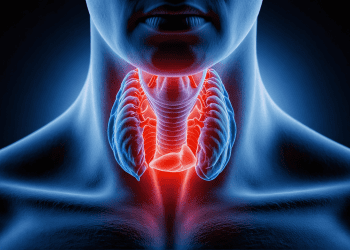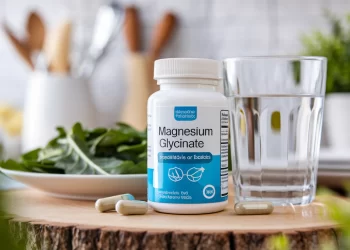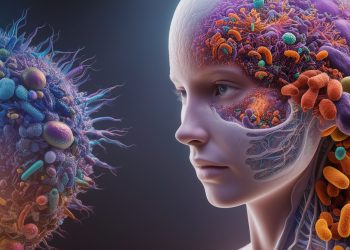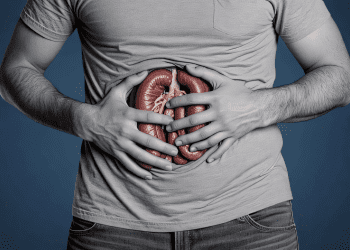Discover how testosterone levels by age affect sexual development, muscle strength, and more.
Testosterone is a hormone produced mainly in the testicles of men and the ovaries of women. It plays a vital role in sexual development, muscle strength and mass, and bone density. As individuals age, their testosterone levels tend to decline gradually. This decrease is prevalent in men as they reach their 30s or 40s. While this gradual decline of testosterone levels is considered normal, it might bring along several physical changes such as decreased desire for sex or inability to maintain an erection.
Individuals with low testosterone levels may opt for medical treatments such as hormone replacement therapy. However, consulting a doctor is essential before proceeding with any treatment as other factors like medication intake could contribute to these changes.
Interestingly, notable research shows that exercise and healthy eating habits can somewhat increase testosterone levels. To sum it up, knowledge about the effect of aging on testosterone is crucial in understanding the variety of changes experienced by individuals throughout their lifespans.
A close friend shared an experience where he had his testosterone level checked when he was experiencing fatigue regularly. His results were lower than expected and enabled him to get medical help timely thus improving his quality of life drastically.
Testosterone is the hormone that makes men act like cavemen; some women wish they were one.
| Key Takeaways |
| 1. Testosterone levels decline gradually with age, particularly in men in their 30s or 40s. This is considered normal but can lead to physical changes such as decreased sex drive and erectile dysfunction. |
| 2. Medical treatments like hormone replacement therapy can address low testosterone levels, but consulting a doctor is essential to assess individual needs and consider potential contributing factors. |
| 3. Exercise and healthy eating habits can increase testosterone levels to some extent. Regular physical activity and a balanced diet enriched with proteins can promote natural testosterone production. |
| 4. Testosterone is crucial for sexual development, muscle strength, bone density, and overall well-being in men. Maintaining healthy testosterone levels is important for reproductive and general health. |
| 5. Testosterone levels vary at different stages of life: low in infants, increasing during puberty, normal in young adults, declining in middle-aged adults, and lower in older adults. |
| 6. Low testosterone symptoms include decreased sex drive, fatigue, mood swings, and erectile dysfunction. It can also contribute to the risk of developing diabetes, osteoporosis, and muscle loss. |
| 7. Causes of low testosterone include age-related decline, testicular damage or disease, pituitary gland disorders, and lifestyle factors such as obesity. |
What is Testosterone?
Testosterone is a steroid hormone that plays a crucial role in the development of male sexual characteristics and reproductive functions. This hormone is primarily produced in the testicles but is also produced by females in smaller amounts. The production of testosterone begins at puberty and gradually declines as one age.
As testosterone levels decrease, men may experience symptoms such as decreased sex drive, erectile dysfunction, fatigue, and mood changes. Regular exercise and a healthy diet can help maintain healthy levels of testosterone as one age.
It is important to note that testosterone replacement therapy (TRT) should only be considered under medical supervision, as it may have potential side effects.
Interestingly, historically, testosterone was first isolated in 1935 by Adolf Butenandt and Leopold Ruzicka, who were awarded the Nobel Prize for Chemistry for their research on this hormone.
Testosterone is essential because, without it, men would just be hairy, grumpy babies with receding hairlines.

Why is Testosterone Important?
Testosterone is a hormone found in both men and women, but it plays a crucial role in men’s physical development and sexual function. Low testosterone levels can lead to various health issues such as decreased sex drive, erectile dysfunction, fatigue, depression, and muscle loss. On the other hand, optimal testosterone levels can improve bone density, muscle mass, mood, cognitive function, and overall physical performance. Therefore, maintaining healthy testosterone levels is essential for men’s reproductive and general health.
As men age, their testosterone levels naturally decrease. The peak of testosterone production occurs during adolescence through early adulthood and gradually declines by 1-2% per year after the age of 30. However, several factors can accelerate this decline such as obesity, stress level, poor sleep quality or quantity, alcohol consumption, smoking habits, or exposure to toxins.
Despite the common misconception that only older men face low testosterone issues; younger men also experience low levels of this hormone due to various reasons such as genetic disorders or unbalanced diet regimes. It is essential to monitor testosterone levels regularly through blood tests with the help of an endocrinologist who specializes in hormonal imbalances.
Pro Tip: Adequate exercise routine (cardiovascular exercises combined with strength training) along with a balanced diet enriched with proteins such as red meat and fish boosts the natural production of Testosterone inside the body and ensures a good night’s rest (around 7-8 hours) regularly.
Age and testosterone levels go hand in hand, but don’t worry, there’s always Viagra.
Average Testosterone Levels by Age
To dive into the world of testosterone levels by age, the section on average testosterone levels by age with sub-sections on testosterone levels in infants, adolescents, young adults, middle-aged adults, and older adults, serves as the perfect guide. Each sub-section explores testosterone levels by age range and highlights the unique characteristics of each stage of life.
Testosterone Levels in Infants
During the early stages of life, infants have low levels of testosterone due to their underdeveloped reproductive system. Their body produces some amount of testosterone, but it is not sufficient for the onset of secondary sexual characteristics. In males, these levels increase rapidly during puberty. However, in females, the levels remain relatively low throughout their lives.
As a baby boy’s body develops after birth, his testes begin producing small amounts of testosterone. The levels remain low until he reaches puberty when they increase slowly and reach adult levels by age 19-21 years. It is crucial to maintain optimal testosterone levels as it plays an essential role in growth and development.
Interestingly, research suggests that testosterone levels may vary based on factors such as ethnicity and genetics. Additionally, certain conditions or medications can affect testosterone production in infant boys.
Pro Tip: Regular check-ups with a pediatrician can help monitor hormone levels and ensure healthy development in infants.
Looks like teens these days can’t blame their lack of testosterone for their attitude problems.
Testosterone Levels in Adolescents
The testosterone levels in individuals during their adolescence stage undergo significant changes. Young boys tend to have increased testosterone levels which can sometimes result in aggressive behaviors, excessive body hair growth, and acne breakouts. During puberty, testosterone reaches its peak level and stabilizes once the individual reaches adulthood. Understanding the changes in testosterone levels during this stage is crucial for parents and physicians to ensure proper development and health in adolescents.
Apart from these changes, other factors such as genetics, physical activity, sleep patterns, and diet can impact the testosterone levels of adolescents. It’s essential to maintain a healthy lifestyle to promote optimal hormone production for proper physical and mental growth.
It’s pertinent to note that low levels of testosterone during adolescence can also pose significant health risks later in life, including infertility, reduced muscle mass, and bone density. Such problems can be avoided by maintaining healthy lifestyles at an earlier age.
It’s imperative that parents remain vigilant with their adolescent children concerning these issues while physicians should advise on taking proactive measures towards enhancing hormonal balance to prevent any future issues.
With the current generation exposed to several lifestyle factors such as dull diets and high screen times, promoting a healthier lifestyle is vital now more than ever; else we may suffer grave consequences.
Youth has the testosterone levels of a bull on steroids but without the actual bull or the steroids.
Testosterone Levels in Young Adults
The testosterone levels of individuals aged between 18 and 35 years are considered normal for young adults. These levels can vary from person to person due to factors such as genetics, lifestyle, and environmental conditions. As per recent studies, in males, testosterone levels range between 270-1070 ng/dL whereas, in females, it ranges from 15-70 ng/dL. Various elements can affect these levels such as sleep patterns, diet, level of physical activity, or exercise habits.
It is important to understand that ideal testosterone levels differ according to age groups and may fluctuate over time with increasing age. Low testosterone levels among younger men may be an indication of medical or health issues that require immediate attention. Therefore, it is advisable to monitor testosterone levels regularly as one reaches middle age and onwards.
Pro-Tip: Regular exercise routines along with a balanced diet consisting of whole foods can maintain optimal hormone levels for overall well-being.
Middle-aged adults may have high levels of stress and responsibility, but at least they still have more testosterone than their teenage kids.
Testosterone Levels in Middle-aged Adults
The testosterone levels in the middle-aged population vary significantly due to various physiological factors. These factors include age, genetics, lifestyle, and existing medical conditions. Testosterone production peaks around the age of 20 and slowly declines over time. It is essential to maintain a healthy lifestyle through regular exercise, a balanced diet, and stress management to keep the levels within an average range. A significant drop in testosterone can lead to several health problems such as decreased muscle mass, mood swings, and low libido.
Moreover, studies suggest that men with specific medical conditions like type 2 diabetes are at high risk of developing low testosterone levels. The body mass index (BMI) also plays a crucial role in determining testosterone levels among middle-aged adults.
A healthy lifestyle can efficiently combat declining testosterone levels. I remember how my father struggled with this issue before making changes in his diet and starting regular exercise. Now he leads an active life with boosted energy levels, improved cognitive functions, and a sense of well-being.
When it comes to testosterone levels in older adults, it’s not just the men who need to worry about losing their mojo.
Testosterone Levels in Older Adults
As we age, our testosterone levels decline. This phenomenon is more pronounced in men than women. Aging has a significant impact on our hormone levels, which results in many physiological changes. The effects of low testosterone levels can include less muscle mass, increased body fat, and decreased libido.
Low testosterone levels are not uncommon in older adults. Men over the age of 60 are particularly vulnerable to having lower-than-average testosterone levels. It is important to note that the range of normal testosterone levels is quite broad, and varies based on factors such as sex, age, and overall health.
In addition to age-related declines in testosterone production, other factors can also contribute to low testosterone. These include obesity, sleep apnea, alcohol use, and certain medications.
Pro Tip: Maintaining a healthy lifestyle and staying active can help maintain testosterone levels as we age. Regular exercise and healthy eating habits can help prevent obesity and other conditions that contribute to low testosterone production.
Low testosterone can leave you feeling like a eunuch at a Renaissance Fair.
| Age Range | Testosterone Levels (ng/dL) |
| Infants | Low levels; gradually increase during puberty |
| Adolescents | Increase during puberty; peak levels; stabilize in adulthood |
| Young Adults | Normal levels; range between 270-1070 ng/dL |
| Middle-aged Adults | Levels decline gradually; impacted by various factors |
| Older Adults | Decline further; lower than young adult levels |
| Age 60 and above | Particularly vulnerable to lower-than-average levels |
Please note that the provided testosterone levels are approximate ranges and may vary depending on individual factors, such as genetics, overall health, and lifestyle choices. It’s important to consult with a healthcare professional to accurately assess and evaluate testosterone levels.
Symptoms of Low Testosterone
Testosterone is an essential hormone for male development and health. Its deficiency can lead to various health complications. Here are some signs that you may be experiencing due to low testosterone levels:
- Decrease in sex drive
- Frequent fatigue
- Mood swings and irritability
- Inability to achieve or maintain an erection
Besides these symptoms, it is also worth noting that lower testosterone levels can contribute to the risk of developing type 2 diabetes and osteoporosis, in addition to muscle loss.
Furthermore, studies show that men who have low testosterone levels are more likely to develop depression. According to data from the New England Journal of Medicine, around 20% of men over the age of 60 suffer from low testosterone levels.
Lastly, it is worth noting that a decrease in testosterone levels isn’t limited only to older men. Younger men too can experience this issue, mainly due to factors such as unhealthy lifestyle choices or underlying medical conditions.
Low testosterone levels can be caused by a variety of factors, from aging to excessive soy consumption – looks like vegans aren’t so manly after all.

Causes of Low Testosterone
Understanding the causes of low testosterone with age-related testosterone decline, testicular damage or disease, pituitary gland disorders, and lifestyle factors is the solution. These sub-sections provide insight into the various factors that can lead to low levels of testosterone, influencing the overall health and wellness of the affected individuals.
Age-related Testosterone Decline
As men age, the levels of testosterone in their bodies tend to decline naturally. This phenomenon is a result of the gradual depletion of Leydig cells located in the testicles that produce testosterone. Testosterone is a hormone that plays an essential role in male development and is responsible for muscle and bone growth, sexual function, red blood cell production, and overall well-being. The rate of decline differs from one person to another but can start as early as age 30.
Although age-related testosterone decline is a natural process, it can lead to several physical and mental problems such as decreased sex drive, erectile dysfunction, weight gain, fatigue, or depression. The symptoms are generally mild at first but could become more severe with time and affect overall life quality. Some other factors may exacerbate testosterone reduction such as obesity, diabetes, or hypertension.
Without proper treatment or lifestyle changes, low testosterone can lead to long-term health issues. Some studies have suggested that it may be linked to cognitive impairment or dementia; however, more research is needed on this subject.
It was only during the last few decades that medical professionals started recognizing low testosterone as a valid condition and established ways of treating it efficiently. The advent of hormone replacement therapy has been ground-breaking in effectively reducing the consequences associated with low testosterone levels.
Seems like low T is just a fancy way of saying you’re firing blanks.
Testicular Damage or Disease
Testicular ailments can impede testosterone production leading to reduced libido, muscle weakness, and decreased energy levels. Any damage caused by inflammation, persistent pain, or even genetic conditions like undescended testes can affect the hormone-producing cells in the testicles. In some cases, chemotherapy and radiation used in cancer treatment may also damage these cells.
Apart from the above-mentioned causes, infections such as mumps orchitis or sexually transmitted diseases can also lead to chronic inflammation of the testes causing permanent damage to the hormone-producing cells. Other factors that increase the risk of facing low testosterone include obesity, poor nutrition, and drug abuse.
It is essential to diagnose any issue with the testicles causing low T-levels early on as it may negatively impact a person’s overall health and well-being. Treatment options including therapy or medication can be effective in regaining normal levels and providing relief from symptoms related to low testosterone. Remember that neglecting symptoms now could hinder your ability to develop muscle mass or even father children later.
Don’t ignore warning signs like low libido, fatigue, or weight gain – see your doctor if you suspect a potential issue with your testosterone levels. Taking action now can help you lead a fulfilled life full of energy and vitality!
Who needs a functioning pituitary gland when you can just blame your low testosterone on your lack of interest in sports?
Pituitary Gland Disorders
The malfunctions related to the master gland situated at the base of the brain, responsible for secreting hormones, can lead to issues like low testosterone levels in men. When there is a deficiency in the hormones stimulating testosterone secretion in the testes due to pituitary gland disorders, it can lead to hypogonadism- the decreased functional activity of gonads. The possibilities that may lead to said malfunctions can be either tumors rupturing localized blood vessels or damage caused during radiation treatment to this region.
Damage caused by the intake of drugs like opiates or cortisol-mimicking steroids, which are generally prescribed for conditions like asthma and rheumatoid arthritis respectively, act as inhibitors affecting hormone production pathways governed by the hypothalamus-pituitary-gonadal axis (HPG Axis).
A less harmless yet possible cause may take shape due to an inflammatory condition called histiocytosis affecting key regions involved in hormone secretion.
Pro Tip – Make sure to get regular check-ups from your primary health care provider once you cross 30 years of age; early detection and diagnosis will go a long way towards healthy aging.
Who needs a gym membership when you can just live a sedentary lifestyle and tank your testosterone levels?
Lifestyle Factors
Certain lifestyle choices and habits may contribute to low testosterone levels. Factors such as excessive alcohol consumption, smoking, lack of exercise, poor sleep habits, and a diet high in processed foods and sugar can all negatively impact testosterone production in the body.
Additionally, obesity and stress have both been linked to lower testosterone levels. Being overweight increases the amount of estrogen produced in the body, which can lead to an imbalance of hormones. Stress can also affect hormone production by increasing cortisol levels, which can suppress testosterone production.
It’s important to note that while these lifestyle factors can contribute to low testosterone, they are not always the sole cause. Other underlying medical conditions or medications may also play a role.
To maintain healthy testosterone levels, it’s essential to adopt a healthy lifestyle that includes regular exercise, stress management techniques, and a diet with plenty of whole foods and nutrients known to support hormone health.
Don’t let low testosterone negatively impact your quality of life. Take charge of your health by making positive lifestyle changes today.
Get your testosterone levels up and your ego down with these treatments.

Treatment for Low Testosterone
To treat low testosterone levels, you can opt for testosterone replacement therapy, or make lifestyle changes, or explore alternative treatments. In the sub-sections of this section titled “Treatment for Low Testosterone” with “Testosterone Replacement Therapy, Lifestyle Changes, Alternative Treatments” as solutions, we will briefly discuss each of these options.
Testosterone Replacement Therapy
- Testosterone Replacement Therapy involves hormone replacement through skin patches, gels, or injections.
- The therapy can take several weeks to achieve optimal results and must be monitored closely by a physician.
- There may be some side effects associated with Testosterone Replacement Therapy such as acne, increased risk of blood clots, and breast enlargement in some men.
- It is not recommended for men with prostate or breast cancer, high red blood cell counts, or sleep apnea.
In addition to the potential side effects, it is essential that patients understand the risks of long-term use of Testosterone Replacement Therapy. Those who choose this option should have regular follow-up appointments to monitor their health.
A study published in The New England Journal of Medicine found that Testosterone Replacement Therapy could improve bone density in older men with low testosterone levels.
Who knew that getting more sleep, eating healthier, and exercising regularly could do more for your testosterone levels than a shot of tequila and a Barry White album?
Lifestyle Changes
By adopting certain modifications in your daily routine, you can effectively combat low testosterone levels. Engage in regular physical activity, maintain a healthy weight, and incorporate a nutritious diet rich in Vitamin D and Zinc to promote healthy hormone production.
Getting an adequate amount of sleep, reducing stress levels, and refraining from excessive alcohol consumption can also aid in boosting testosterone levels. It is important to effectively manage any underlying medical conditions that may be contributing to low testosterone.
It is important to note that lifestyle changes may not always alleviate low testosterone levels completely and medical treatment may be necessary. However, by incorporating these simple modifications into your daily routine, you can support healthy hormone production and improve overall wellness.
According to a study published in the Journal of Clinical Endocrinology & Metabolism, men with low testosterone levels are at increased risk for cardiovascular disease and diabetes.
Looking for an alternative treatment for low testosterone? How about pretending to be a wrestler and going on a juice cleanse? Just kidding, please don’t do that.
Alternative Treatments
Existing treatments for low testosterone levels may not work for everyone. In addition, there are various complementary and integrative modalities that can be used as alternative therapies.
Some studies suggest that acupuncture, herbal remedies, and exercise may help improve testosterone levels. Acupuncture has been found to boost sperm count and increase serum testosterone levels in men with infertility. Herbal remedies such as ashwagandha may help improve sexual function and increase testosterone levels. Exercise has also been shown to have a positive impact on testosterone production.
Studies have shown that regular physical activity can help increase testosterone levels in both men and women. Weight lifting and resistance training are particularly effective at improving the body’s natural production of this hormone. In addition, combining exercise with other lifestyle changes like adopting a healthier diet and getting enough sleep may also prove beneficial in improving overall well-being.
It is important to note that these alternative treatments should not be viewed as substitutes for conventional medical care. Instead, they should be regarded as complementary therapies that can be used alongside established treatments to improve overall health outcomes.
According to a study published in The Journal of Clinical Endocrinology & Metabolism, men with low testosterone levels experience higher rates of depression than those with normal hormone levels.
The risk of testosterone therapy is giving me more anxiety than low Testosterone ever could.

Risks and Side Effects of Testosterone Therapy
Testosterone replacement therapy can have unintended consequences. It’s important for patients and their doctors to take note of potential complications that may result from testosterone therapy use. Dangers arise with overuse or limited monitoring, which include heart disease, sleep apnea, acne, and an enlarged prostate.
It is imperative to know the risks associated with testosterone therapy before starting treatment. Common side effects include hair loss, breast enlargement, testicular shrinkage, mood swings, and fluid retention. In rare cases, blood clots and liver problems have been reported.
Patients should never adjust their dosage without consulting their doctor. It’s also important to keep a tab on your cholesterol levels if you’re taking testosterone therapy as this can increase cholesterol build-up in the arteries. Many people who opt for testosterone therapy misuse it or fail to monitor its effects properly.
Sexual dysfunction is commonly seen in men who don’t produce enough naturally-occurring testosterone. An individual’s sexual function improves remarkably following a proper therapeutic dose of the hormone.
A client in 50’s who underwent testosterone replacement therapy was initially thrilled with its positive impact on energy levels and libido until intensified hair growth ensued giving them unwanted side effects causing discomfort toward body aesthetics resulting in discontinuing treatment for fear of long-term risks and adverse reactions.
Understanding your testosterone levels by age may not make you invincible, but it could definitely make you feel like it’s worth a shot.
Conclusion: Understanding Testosterone Levels
Testosterone levels vary greatly with age. At each stage of life, the appropriate hormone levels are essential to maintain male physical and sexual characteristics. These hormones can decline naturally with age and lead to various issues for men, such as reduced muscle mass, decreased sex drive, infertility, and more.
Understanding testosterone levels by age is important for early diagnosis and treatment of ensuing complications. During puberty, testosterone levels surge in males leading to physical changes like a deep voice and hair growth. In adulthood, these hormones help improve bone density and maintain muscle mass. However post-30 there is a gradual decline in the hormone levels which can impact men’s overall health.
Research suggests that low testosterone symptoms are often ignored due to fear or shame – something that should not happen. Men struggle to address this problem because they don’t know enough about it or don’t realize it could be an issue that needs consultation from medical professionals. Hence, getting regular checkups is paramount to identifying any possible issues at an early stage to maintain healthy testosterone levels by age throughout life.
Frequently Asked Questions
Q: What is testosterone?
A: Testosterone is a hormone primarily produced in the testicles of men and in smaller amounts in the ovaries of women. It plays a crucial role in sexual development, muscle strength, and bone density.
Q: How do testosterone levels change as men age?
A: Testosterone levels naturally decline with age, particularly in men reaching their 30s or 40s. This gradual decline is considered normal and can lead to physical changes such as decreased sex drive and erectile dysfunction.
Q: Are there medical treatments for low testosterone levels?
A: Yes, individuals with low testosterone levels may opt for medical treatments such as hormone replacement therapy (TRT). However, consulting a doctor is essential to assess individual needs and consider potential contributing factors before proceeding with any treatment.
Q: Can lifestyle changes increase testosterone levels?
A: Yes, certain lifestyle changes can help increase testosterone levels to some extent. Regular exercise, particularly cardiovascular exercises combined with strength training, and a balanced diet enriched with proteins can promote natural testosterone production.
Q: Why is testosterone important?
A: Testosterone is important for sexual development, muscle strength, bone density, and overall well-being in men. Maintaining healthy testosterone levels is crucial for reproductive and general health.
Q: What are the symptoms of low testosterone?
A: Symptoms of low testosterone, also known as “low T,” can include decreased sex drive, fatigue, mood swings, and erectile dysfunction. It can also contribute to the risk of developing diabetes, osteoporosis, and muscle loss.
Q: What are the causes of low testosterone?
A: Causes of low testosterone include age-related decline, testicular damage or disease, pituitary gland disorders, and lifestyle factors such as obesity, poor sleep quality, excessive alcohol consumption, and smoking habits.
Q: What are the risks and side effects of testosterone replacement therapy?
A: Testosterone replacement therapy (TRT) can have potential risks and side effects, including acne, increased risk of blood clots, breast enlargement in men, and potential long-term health risks. It is important to have regular follow-up appointments with a doctor while undergoing TRT.
Q: How can one maintain healthy testosterone levels as they age?
A: Regular exercise, maintaining a balanced diet, getting enough sleep, managing stress levels, and addressing underlying medical conditions can help maintain healthy testosterone levels as one ages.
Q: Can younger men also experience low testosterone levels?
A: Yes, younger men can also experience low testosterone levels due to factors such as genetic disorders or unhealthy lifestyle choices. Regular monitoring of testosterone levels through blood tests is important, especially for those with symptoms or underlying medical conditions.












